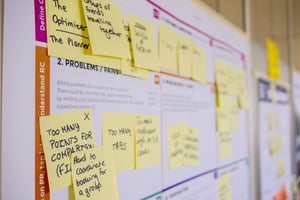Join the InfoLit Learning Community now. Already a member? Log in here.
 Last week’s blog post discussed what to do if your accreditation visit involves discussing a mistake or lapse in some aspect of your library’s work. Communicating that without ruining your accreditation chances can be a minefield. But what if you’re gearing up to tell the committee about a great success? It might seem like an easy task at first, but there’s a knack to being forthright about success while maintaining the academic tone required in an accreditation report or interview.
Last week’s blog post discussed what to do if your accreditation visit involves discussing a mistake or lapse in some aspect of your library’s work. Communicating that without ruining your accreditation chances can be a minefield. But what if you’re gearing up to tell the committee about a great success? It might seem like an easy task at first, but there’s a knack to being forthright about success while maintaining the academic tone required in an accreditation report or interview.
No matter how self-evidently great you believe your program to be, you’ll need to document it just as you would any other effort, with hard data regarding what it took to make the project work and what its outcomes were. Let’s say you implemented a new IL program since the last time the accreditors visited. Back then, you were in a situation in which faculty were not as engaged in IL work as you would have liked, whereas now they regularly discuss the importance of IL and look to the library for leadership in that area. You will have to prove that the program led to the new prominence of IL in your institution. Look at who attended any sessions you held for faculty, for example, and correlate the list with classes in which IL librarians have a new presence. Use the list of new classes that your staff has been invited into and match it with grade changes or with who visits the library for assistance. Look at resource-usage indicators, too. If librarians are newly presenting to engineering students, for example, has the usage of engineering databases has increased? That’s worth noting.
Draw upon the library’s champions among the faculty when you’re writing your accreditation report. Ask them to comment upon the positive changes that you’re documenting. To what do they attribute the progress they observe? Is there departmental-level data they can share that shows the positive impact of the changes you’ve made? Talk to students, as well, and ask their opinion of the project you plan to trumpet in your accreditation report. The user perspective should be valued by accreditors and any effusiveness (we can hope!) will come across as more authentic from a student than from a staff member. When you’re talking to students and faculty, don’t forget to target all your populations—online as well as in-house, evening as well as day, adjuncts as well as full-time professors, etc. You might be surprised what you’ll unearth.
Finally, there is help available online; see, for example, the ITHAKA S+R report “Advocacy and Assessment: Communicating and Maximizing Library Value,” and Achieve’s “Communicating Success Stories,” (as you’ll want to accompany your data with narrative discussions of success). And if you’re going to the upcoming ALA annual conference in New Orleans, there is a related program on the schedule: at an ACRL preconference on Friday, June 22, Lisa Janicke-Hinchliffe will present “Assessment in Action: Demonstrating and Communicating Library Contributions to Student Learning and Success."
For more advice on preparing for your accreditation visit, please see last week’s blog post, “Setting Your Sights on Accreditation.” Remember, too, that you can always ask for advice, on this or other librariship topics, in Credo’s InfoLit Learning Community. We hope to see you there!
